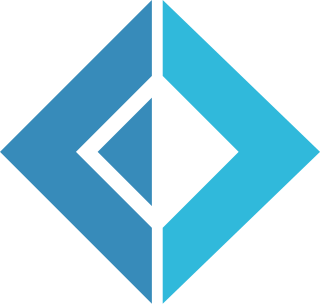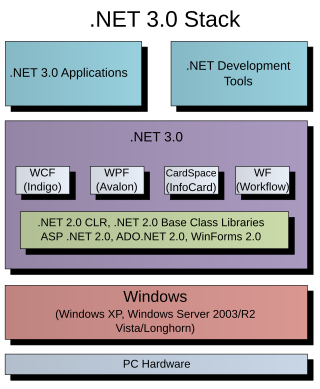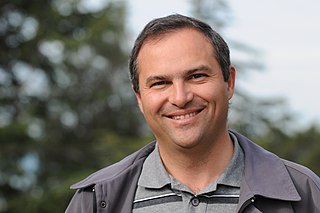Related Research Articles

Stephen Arthur Cook is an American-Canadian computer scientist and mathematician who has made significant contributions to the fields of complexity theory and proof complexity. He is a university professor emeritus at the University of Toronto, Department of Computer Science and Department of Mathematics.
In computing, just-in-time (JIT) compilation is compilation during execution of a program rather than before execution. This may consist of source code translation but is more commonly bytecode translation to machine code, which is then executed directly. A system implementing a JIT compiler typically continuously analyses the code being executed and identifies parts of the code where the speedup gained from compilation or recompilation would outweigh the overhead of compiling that code.

F# is a general-purpose, strongly typed, multi-paradigm programming language that encompasses functional, imperative, and object-oriented programming methods. It is most often used as a cross-platform Common Language Infrastructure (CLI) language on .NET, but can also generate JavaScript and graphics processing unit (GPU) code.
SIGPLAN is the Association for Computing Machinery's Special Interest Group on programming languages.

Windows Workflow Foundation (WF) is a Microsoft technology that provides an API, an in-process workflow engine, and a rehostable designer to implement long-running processes as workflows within .NET applications. The latest version of WF was released as part of the .NET Framework version 4.5 and is referred to as (WF45).

Moshe Ya'akov Vardi is an Israeli mathematician and computer scientist. He is the Karen Ostrum George Distinguished Service Professor in Computational Engineering at Rice University, United States. and a faculty advisor for the Ken Kennedy Institute. His interests focus on applications of logic to computer science, including database theory, finite model theory, knowledge of multi-agent systems, computer-aided verification and reasoning, and teaching logic across the curriculum. He is an expert in model checking, constraint satisfaction and database theory, common knowledge (logic), and theoretical computer science.

Live distributed object refers to a running instance of a distributed multi-party protocol, viewed from the object-oriented perspective, as an entity that has a distinct identity, may encapsulate internal state and threads of execution, and that exhibits a well-defined externally visible behavior.
In type theory, bounded quantification refers to universal or existential quantifiers which are restricted ("bounded") to range only over the subtypes of a particular type. Bounded quantification is an interaction of parametric polymorphism with subtyping. Bounded quantification has traditionally been studied in the functional setting of System F<:, but is available in modern object-oriented languages supporting parametric polymorphism (generics) such as Java, C# and Scala.

George Ciprian Necula is a Romanian computer scientist, engineer at Google, and former professor at the University of California, Berkeley who does research in the area of programming languages and software engineering, with a particular focus on software verification and formal methods. He is best known for his Ph.D. thesis work first describing proof-carrying code, a work that received the 2007 SIGPLAN Most Influential POPL Paper Award.
Haskell is a general-purpose, statically-typed, purely functional programming language with type inference and lazy evaluation. Designed for teaching, research, and industrial applications, Haskell has pioneered a number of programming language features such as type classes, which enable type-safe operator overloading, and monadic input/output (IO). It is named after logician Haskell Curry. Haskell's main implementation is the Glasgow Haskell Compiler (GHC).
Windows Runtime (WinRT) is a platform-agnostic component and application architecture first introduced in Windows 8 and Windows Server 2012 in 2012. It is implemented in C++ and officially supports development in C++, Rust/WinRT, Python/WinRT, JavaScript-TypeScript, and the managed code languages C# and Visual Basic .NET (VB.NET).
Conor McBride is a Reader in the department of Computer and Information Sciences at the University of Strathclyde. In 1999, he completed a Doctor of Philosophy (Ph.D.) in Dependently Typed Functional Programs and their Proofs at the University of Edinburgh for his work in type theory. He formerly worked at Durham University and briefly at Royal Holloway, University of London before joining the academic staff at the University of Strathclyde.
C++/CX(C++ component extensions) is a language projection for Microsoft's Windows Runtime platform. It takes the form of a language extension for C++ compilers, and it enables C++ programmers to write programs that call Windows Runtime (WinRT) APIs. C++/CX is superseded by the C++/WinRT language projection, which is not an extension to the C++ language; rather, it's an entirely standard modern ISO C++17 header-file-based library.

Jayadev Misra is an Indian-born computer scientist who has spent most of his professional career in the United States. He is the Schlumberger Centennial Chair Emeritus in computer science and a University Distinguished Teaching Professor Emeritus at the University of Texas at Austin. Professionally he is known for his contributions to the formal aspects of concurrent programming and for jointly spearheading, with Sir Tony Hoare, the project on Verified Software Initiative (VSI).

Gavin James Wood is an English computer scientist, a co-founder of Ethereum and creator of Polkadot and Kusama.

Jacob O. Wobbrock is a Professor in the University of Washington Information School and, by courtesy, in the Paul G. Allen School of Computer Science & Engineering at the University of Washington. He is Director of the ACE Lab, Associate Director and founding Co-Director Emeritus of the CREATE research center, and a founding member of the DUB Group and the MHCI+D degree program.

Grigore Roșu is a computer science professor at the University of Illinois at Urbana-Champaign and a researcher in the Information Trust Institute. He is known for his contributions in runtime verification, the K framework, matching logic, and automated coinduction.
Dale Miller is an American computer scientist and author. He is a Director of Research at Inria Saclay and one of the designers of the λProlog programming language and the Abella interactive theorem prover.
References
- 1 2 3 Syme, Don. "Interview with Don Syme", Simple Talk, 19 January 2010.
- ↑ Kennedy and Syme, http://portal.acm.org/citation.cfm?id=378797 "Design and implementation of generics for the .NET Common language runtime"
- ↑ Kennedy, Syme, Yu http://portal.acm.org/citation.cfm?id=964005 "Formalization of generics for the .NET common language runtime"
- ↑ Syme, Don et al. "Expert F# at Apress", Apress , November 2012.
- ↑ Syme, Don. "Don Syme at Microsoft Research", 19 January 2010.
- ↑ "Microsoft researcher Don Syme honored with Silver Medal from Royal Academy of Engineering".